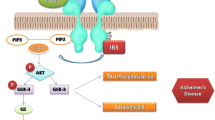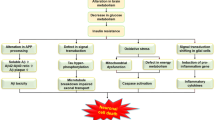Summary.
The hypothesis is forwarded that sporadic late-onset Alzheimer disease is caused by non-insulin dependent diabetes mellitus which is confined to the brain. This hypothesis is based on the findings of Frölich and coworkers (this volume) who clearly demonstrate a perturbation of the neuronal insulin/insulin receptor signal transduction pathway which is considered to be the pathobiochemical basis for the drastic reduction in glucose/energy metabolism in Alzheimer brain. As a consequence of this abnormality, advanced glycation end products are formed. Münch et al. (this volume) evaluate the impacts of the latter related to oxidative stress and the formation of β-amyloid and neurofibrillary tangles.
Similar content being viewed by others
Author information
Authors and Affiliations
Additional information
Accepted November 13, 1997; received September 19, 1997
Rights and permissions
About this article
Cite this article
Hoyer, S. Is sporadic Alzheimer disease the brain type of non-insulin dependent diabetes mellitus? A challenging hypothesis. J Neural Transm 105, 415–422 (1998). https://doi.org/10.1007/s007020050067
Issue Date:
DOI: https://doi.org/10.1007/s007020050067




